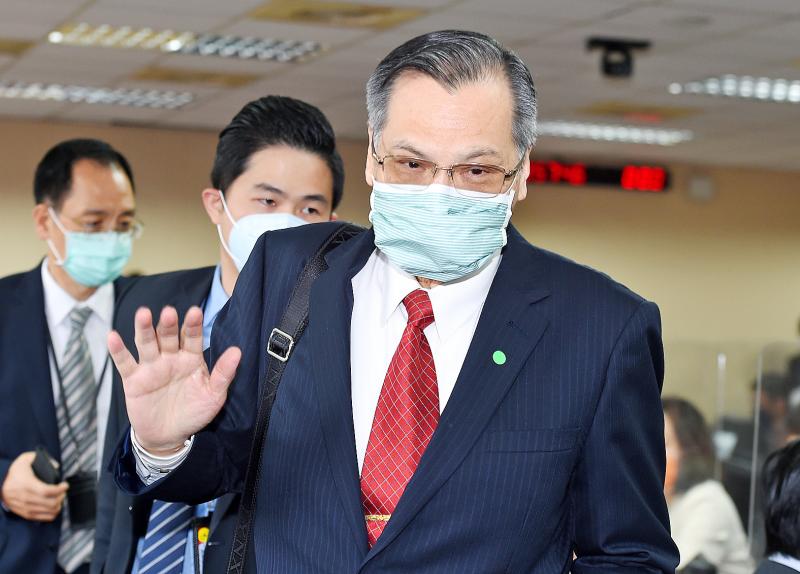The nation’s intelligence chief yesterday said that some local Internet celebrities are being paid by the Chinese Communist Party (CCP) to conduct “cognitive warfare” campaigns in Taiwan and help Beijing spread propaganda.
National Security Bureau (NSB) Director-General Chen Ming-tong (陳明通) said that one example happened in early March following Russia’s invasion of Ukraine, when a Taiwanese Internet celebrity on TikTok claimed that the Chinese government was offering to evacuate Taiwanese from the European nation.
The NSB later found that the TikTok celebrity was not in Ukraine, but based in the Chinese city of Hangzhou, Chen said, adding that the person had been trained by the CCP to use social media to spread propaganda as part of its “united front” efforts.

Photo: Liao Chen-huei, Taipei Times
The NSB has a full grasp on such “cognitive warfare” campaigns, and related authorities are investigating, Chen said, without elaborating.
Chen made the comments at the legislature in Taipei in response to a report in the Taipei Times and the Chinese-language Liberty Times (the sister newspaper of the Taipei Times) that Beijing has been training and paying Taiwanese to influence young Taiwanese on media platforms such as YouTube, TikTok and Little Red Book, also known as Xiaohongshu, the Chinese equivalent of Instagram.
A number of high-profile Taiwanese YouTube celebrities based in China attended the fifth Cross-Strait Youth Development Forum in Hangzhou, China, on Wednesday, during which they shared their successes in running their social media platforms while encouraging more young Taiwanese to join them, the report said.
The report quoted Democratic Progressive Party lawmakers, who called on the government to come up with measures to counter China’s use of Taiwanese Internet celebrities to conduct “cognitive warfare” against young Taiwanese.
The forum was joined by about 450 guests and youth representatives from both sides of the Taiwan Strait, including former Chinese Nationalist Party (KMT) chairwoman Hung Hsiu-chu (洪秀柱), Chinese media reports said.

Right-wing political scientist Laura Fernandez on Sunday won Costa Rica’s presidential election by a landslide, after promising to crack down on rising violence linked to the cocaine trade. Fernandez’s nearest rival, economist Alvaro Ramos, conceded defeat as results showed the ruling party far exceeding the threshold of 40 percent needed to avoid a runoff. With 94 percent of polling stations counted, the political heir of outgoing Costa Rican President Rodrigo Chaves had captured 48.3 percent of the vote compared with Ramos’ 33.4 percent, the Supreme Electoral Tribunal said. As soon as the first results were announced, members of Fernandez’s Sovereign People’s Party

EMERGING FIELDS: The Chinese president said that the two countries would explore cooperation in green technology, the digital economy and artificial intelligence Chinese President Xi Jinping (習近平) yesterday called for an “equal and orderly multipolar world” in the face of “unilateral bullying,” in an apparent jab at the US. Xi was speaking during talks in Beijing with Uruguayan President Yamandu Orsi, the first South American leader to visit China since US special forces captured then-Venezuelan president Nicolas Maduro last month — an operation that Beijing condemned as a violation of sovereignty. Orsi follows a slew of leaders to have visited China seeking to boost ties with the world’s second-largest economy to hedge against US President Donald Trump’s increasingly unpredictable administration. “The international situation is fraught

MORE RESPONSIBILITY: Draftees would be expected to fight alongside professional soldiers, likely requiring the transformation of some training brigades into combat units The armed forces are to start incorporating new conscripts into combined arms brigades this year to enhance combat readiness, the Executive Yuan’s latest policy report said. The new policy would affect Taiwanese men entering the military for their compulsory service, which was extended to one year under reforms by then-president Tsai Ing-wen (蔡英文) in 2022. The conscripts would be trained to operate machine guns, uncrewed aerial vehicles, anti-tank guided missile launchers and Stinger air defense systems, the report said, adding that the basic training would be lengthened to eight weeks. After basic training, conscripts would be sorted into infantry battalions that would take

GROWING AMBITIONS: The scale and tempo of the operations show that the Strait has become the core theater for China to expand its security interests, the report said Chinese military aircraft incursions around Taiwan have surged nearly 15-fold over the past five years, according to a report released yesterday by the Democratic Progressive Party’s (DPP) Department of China Affairs. Sorties in the Taiwan Strait were previously irregular, totaling 380 in 2020, but have since evolved into routine operations, the report showed. “This demonstrates that the Taiwan Strait has become both the starting point and testing ground for Beijing’s expansionist ambitions,” it said. Driven by military expansionism, China is systematically pursuing actions aimed at altering the regional “status quo,” the department said, adding that Taiwan represents the most critical link in China’s